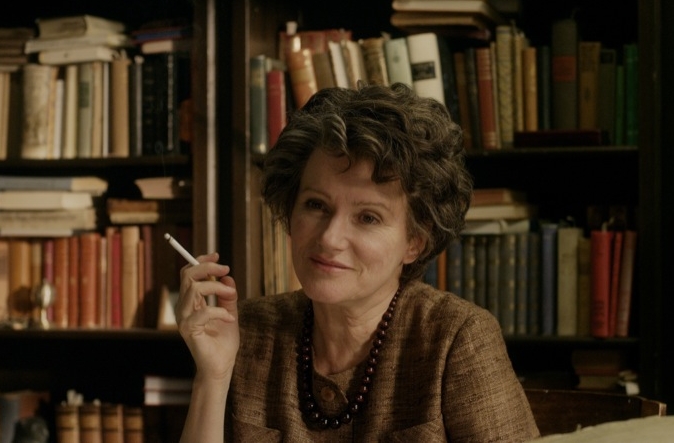By Armond White
Filmed under the working title “The Controversy,” Margarethe von Trotta’s bio-pic Hannah Arendt (now at Film Forum), about the renown German Jewish critic and philosopher, combines gossipy insight into the New York literary society of the 1960s with a more serious story of political morality.
 Those seemingly opposite issues converged into scandal when, in 1961, Arendt wrote a series of articles for The New Yorker magazine about Israel’s trial of Nazi bureaucrat Adolf Eichmann. Arendt’s “report” (later published as the book Eichmann in Jerusalem: A Report on the Banality of Evil) enraged her New York literary and academic circle for her proposition on Jewish “resistance and cooperation.”
Those seemingly opposite issues converged into scandal when, in 1961, Arendt wrote a series of articles for The New Yorker magazine about Israel’s trial of Nazi bureaucrat Adolf Eichmann. Arendt’s “report” (later published as the book Eichmann in Jerusalem: A Report on the Banality of Evil) enraged her New York literary and academic circle for her proposition on Jewish “resistance and cooperation.”
It is the sense of controversy that makes the movie fascinating–a warm-bodied movie, rather than a semi-documentary on the Eichmann trial or Arendt’s philosophical processes. Those subjects–not exactly “hot topics”–become accessible through Von Trotta’s expected feminist focus: Arendt’s struggle to maintain compassion and individuality in situations where harsh judgment are the norm and women are traditionally subjugated to male authority (which includes female attraction to masculine charisma). Von Trotta finds this drama in personal life (Arendt’s youth as student and lover of philosopher Martin Heidegger, her marriage to Christian professor Heinrich Buhle) and her professional standing in both academia and literature.
Scrutinizing womanliness in Arendt’s friendship with literary titan Mary McCarthy, Von Trotta introduces both enjoying girl talk about men, smoking cigarettes as fuel symbolizes their burning egos and libidoes. Their access to the world of ideas and intellectual power begins with a female sense of potential. “People hope to have some possibility of power,” Arendt says. Von Trotta (and co-screenwriter Pamela Katz) depict her life as a story about “passionate thinking.” The related concept of intellectual courage comes through in Arendt’s eventually damning assessment of Eichmann and her own struggle against New York’s ring of self-righteous writers, professors and pundits–a verboten subject these days but targeted here with refreshing pith.
Having watched Eichmann answer questions in a bullet-proof glass booth (actual b&w trial footage merged with Von Trotta’s drama), the intrigued and outraged Arendt herself became a caged public figure, espied and despised by the cultural elite who once had welcomed her postwar exile. When editing a 1968 Walter Benjamin anthology, Arendt drew on her own experience with the literary mob: “Despite their pose of being above politics [they] were fully as conversant with the basic principles of literary maneuvers as the professors were with the fundamentals of academic politics or the hacks and journalists with the ABC of ‘One good turn deserves another.’”
Treating Arendt’s controversy as a female experience, Von Trotta sensitively shows the ABCs of privileged literary life–sometimes disapprovingly, sometimes as wittily as Doug McGrath did in Infamous, the better Truman Capote movie about the writing of In Cold Blood.
Playing Arendt, Barbara Sukowva, who was Fassbinder’s Lola, brings the role valuable emotional juice and credible articulacy. The marriage scenes with Axel Milberg are as fine as in Luc Besson’s The Lady, her other relationships balance gender tension–with men (Michael Degen, Klaus Pohl) and with McTeer’s smiley, loyal McCarthy (who has a pointed, amusing tiff with a Norman Mailer figure.) In the big speech clarifying Arendt’s philosophical project and ethnic identity, her intellectual pride gives a Dietrich slant to Sukowa’s jaw. Sexy, but also Von Trotta’s ultimate feminist statement.
Arendt’s controversy isn’t as momentous as the Truth and Reconciliation trials in John Boorman’s In My Country, but neither is it a trashy Holocaust exploitation like The Reader. Von Trotta and Sukowva take the same risk as Maximilian Schell in the 1975 film of Robert Shaw’s play The Man in the Glass Booth which used the Eichmann trial to explore the post-war legacy of responsibility, guilt, personal and political identity. It’s a novel approach to those issues at the heart of the German New Wave where Von Trotta began as an actress and are successfully maneuvered here. If an intellectual audience remains in New York’s art film community, Hannah Arendt ought to be a hit.
Follow Armond White on Twitter at 3xchair
